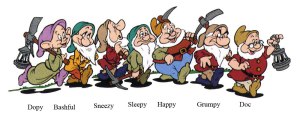- Get practice iterating through lists
- Build functions and control their return values.
- Interpreter: a program that executes other programs. Python programs require the Python interpreter to be installed on your computer so that they can be run.
- Python Shell: an interactive interpreter that can be accessed from the command line.
- Data Type: a specific kind of data. The Python interpreter uses these types to determine which actions can be performed on different data items.
- Exception: a type of error that can be predicted and handled without causing a program to crash.
- Code Block: a collection of code that is interpreted together. Python groups code blocks by indentation level.
- Function: a named code block that performs a sequence of actions when it is called.
- Scope: the area in your program where a specific variable can be called.
To get started, run pipenv install to create your virtual environment and
pipenv shell to enter the virtual environment. Then run pytest -x to run
your tests. Use these instructions and pytest's error messages to complete
your work in the lib/ folder.
There are four functions to complete in this lab:
roll_call_dwarves()summon_captain_planet()long_planeteer_calls()find_the_cheese()
This function should accept a list of dwarf names, for instance:
["Doc", "Dopey", "Bashful", "Grumpy"]It should then print out each name, in number order, using print. The print-out
should look like this:
1. Doc
2. Dopey
3. Bashful
4. GrumpyThis function should accept a list of planeteer calls as an argument, e.g.:
planeteer_calls = ["earth", "wind", "fire", "water", "heart"]It should then capitalize each element and add an exclamation point at the end. The return value of this function should be a list, as in this example:
summon_captain_planet(planeteer_calls)
#=> ["Earth!", "Wind!", "Fire!", "Water!", "Heart!"]Hint: You may want to review list comprehension for this one.
The long_planeteer_calls() function should accept a list of calls as an
argument. The function should tell us if any of the calls are longer than four
characters. For example:
short_words = ["puff", "go", "two"]
long_planeteer_calls(short_words)
#=> False
assorted_words = ["two", "go", "industrious", "bop"]
long_planeteer_calls(assorted_words)
#=> TrueNotice the return value of this function is either True or False, depending on
the list it was given as an argument.
The find_the_cheese() function should accept a list of strings. It should then
look through these strings to find and return the first string that is a type of
cheese. The types of cheese that appear are "cheddar", "gouda", and
"camembert".
For example:
snacks = ["crackers", "gouda", "thyme"]
find_the_cheese(snacks)
#=> "gouda"
soup = ["tomato soup", "cheddar", "oyster crackers", "gouda"]
find_the_cheese(soup)
#=> "cheddar"If, sadly, a list of ingredients does not include cheese, return None:
ingredients = ["garlic", "rosemary", "bread"]
find_the_cheese(ingredients)
#=> NoneYou can assume that all strings will be lowercase. Take a look at the
in keyword for a hint. This function asks you to return a string
value instead of printing it so keep that in mind.


